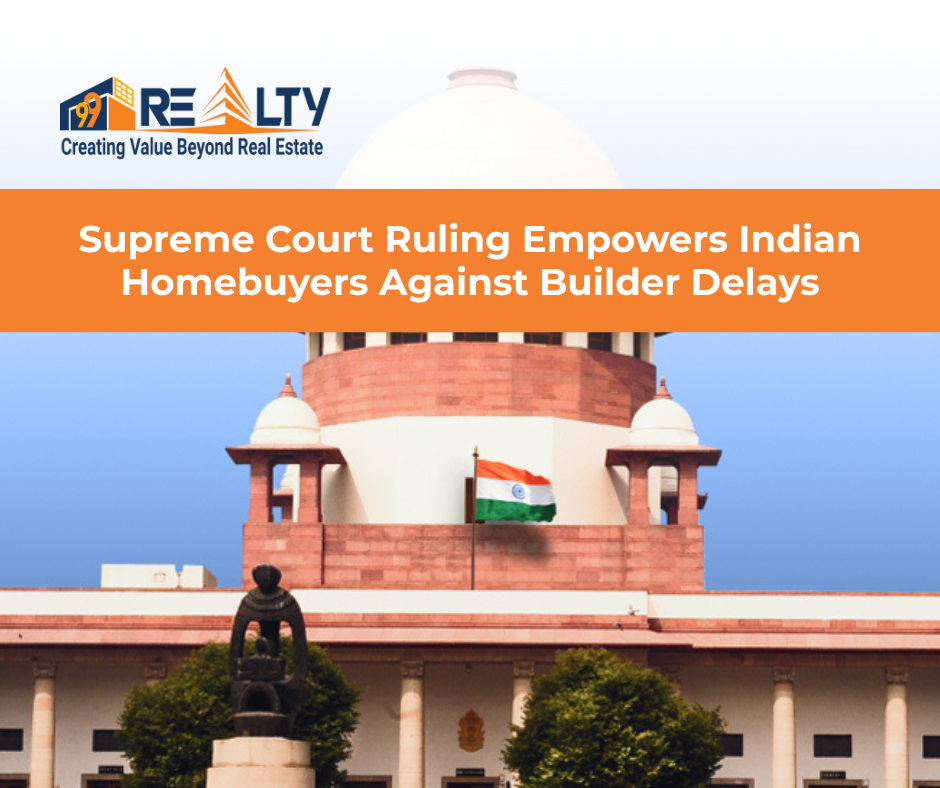Imagine saving for years, finally booking your dream home, only to wait endlessly for possession. Frustrating, isn’t it? This is exactly what thousands of Indian homebuyers have faced. But a recent Supreme Court ruling has flipped the script, ensuring builders face the same financial penalties for delays that they impose on buyers.
SC Urges Powerful Fund to Rescue Stalled Projects
Understanding the Supreme Court’s Verdict
Case Background
A homebuyer waited over a decade for possession while the developer enjoyed charging 18% interest on the buyer’s delayed payments of installments. Yet, the consumer forum granted only 9% interest on the builder’s delay. The buyer escalated the matter, and the Supreme Court stepped in.
Key Highlights of the Judgment
- Builders must now pay the same interest rate they charge buyers for late payments when they delay possession.
- The apex court directed a refund of principal with 18% interest within two months.
- The judgment emphasized “equity and fairness,” ensuring no party escapes with a “manifestly wrong bargain.”
Why This Ruling Matters for Homebuyers
Financial Protection
Previously, builders imposed high penalties on buyers but escaped with nominal liabilities for their own defaults. This ruling levels the playing field, offering real financial protection to buyers.
Mistakes Prospective Homebuyers Should Avoid
Psychological Relief
Beyond money, the stress and anxiety of waiting for years take a toll. Now, with parity in penalties, homebuyers have a stronger legal backing and mental relief.
Impact on Real Estate Developers
Accountability and Transparency
This judgment signals an era of heightened accountability. Builders can no longer treat penalties as a one-way street.
Reassessing Business Models
Developers will need to tighten project planning, financing, and delivery schedules to avoid hefty payouts in case of delays.
Interest Rates: The Core of the Dispute
How Builders Charge Buyers
Standard builder-buyer agreements often impose steep interest rates—up to 18%—on delayed installment payments.
Why the Court Favoured Parity
The bench reasoned: if buyers can be penalized at 18% for delay payments, fairness demands builders face the same for defaulting on possession timelines.
Legal Precedents and Consumer Rights
National Consumer Disputes Redressal Commission‘s (NCDRC) Previous Approach
Consumer commissions earlier limited builder liability to 9% interest, citing “reasonableness” across cases.
The Supreme Court’s Shift
The SC clarified there’s no blanket rule against awarding the same rate charged by builders. Each case must consider its own facts, and in this instance, fairness required full parity.
Implications for Future Projects
Contract Drafting
Developers will have to carefully draft buyer agreements, ensuring terms are balanced and legally defensible.
Timely Possession as a Norm
With higher penalties, timely possession may finally become the standard rather than an exception.
Tips for Homebuyers Post-Verdict
Checking Builder’s Reputation
Before booking, research the developer’s track record on timely possession and litigation history.
Reading the Fine Print
Scrutinize clauses on interest, refunds, and possession timelines. Don’t hesitate to negotiate for balanced terms.
What Developers Must Keep in Mind
Aligning Payment Terms Fairly
Builders should set interest rates and timelines they can realistically meet, reducing disputes and liabilities.
Building Trust for Long-Term Gains
Transparent practices and timely delivery not only avoid penalties but also boost brand reputation, leading to repeat customers.
Conclusion
The Supreme Court’s ruling is a landmark moment for India’s real estate sector. It restores balance to the builder-buyer relationship, ensuring fairness on both sides. For homebuyers, it’s a powerful legal shield. For developers, it’s a wake-up call to prioritize timely delivery and fair contracts.
Need Help?
Need help evaluating a property or planning your next move in the market?
Reach out to 99 REALTY – your trusted real estate partner for smarter choices.
Subscribe to get updates on our latest posts and market trends.






Join The Discussion